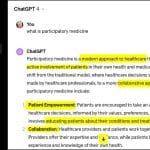Our friends over at GetMyHealthData have put up a terrific post breaking down exactly how/why all people can access their health data. Get YOUR data – it’s yours! Here’s the whole GIF-rich party.
Cats have nine lives to figure out how to get their health data, but you don’t have that kind of time. Here are 9 facts about digital health records from the curious cats that lived to tell the tale (or tail!).
1. Paper, printers, faxes…things of the past. Get your health data electronically!

Sure, you could get your paper record. But who needs stacks of paper when you have the right under HIPAA to digital copies of your health record?
2. Yes, it really can be electronic AND in the format you want.

PDFs are convenient, but there’s not much you can do with that information in this digital era. Structured data is stored in fixed fields (kind of like cells in an Excel spreadsheet) that can be uploaded into a mobile health application, or another provider’s electronic health record. You can ask for the format that best meets your needs – you don’t have to settle for a PDF.
3. Say no to snail mail! You can get your health data emailed to you.

Everyone else is on email, so why can’t you get your health data that way? Oh wait, you totally can! The law allows providers to send your digital data to traditional email accounts (like a Gmail address) or use more secure methods (like a Direct address), based on your personal preference.
4. Do I have to pay for my data? Fee-line tips on fees for access

Recent federal policy encourages providers to offer patients electronic copies of their health information free of charge.
However, you may be charged for the cost of copying, creating, or/and mailing a copy your health records. But you cannot be charged for the cost of searching for or retrieving the information! Similarly, you cannot be charged for online access via most patient portals, or per-page fees for electronic copies. Your provider must estimate fees up front.
Fur-thermore, you cannot be denied your health records if you have not yet paid for services.
5. You deserve your data ASAP!

Electronic access to your health data should be lickety-split! Providers have 30 days under the law, but when your records are electronic, the federal government says they should get them to you sooner. If your providers need extra time, they have one 30-day extension. That is 60 days max!
6. You can really have it all (or pretty close to it all anyway)!

The world is your tuna can! You are not limited to one type of health data. Your x-rays, lab tests, and clinical notes are all part of your health record and you have the right to receive this information digitally as long as the providers have the technology. Genomic data generated by HIPAA covered providers is also included.
7. I have to drive where?

No one can require you to get in your car and drive to an office to verify your identity and pick up your digital records. Save gas and time! Ask your provider about other methods of identity verification.
8. There’s an app for that!

You have the right to ask that your data be sent to “third parties,” including mobile health applications or other kinds of software. Apps can help you store, organize and use your health data. Confirming the date of your last tetanus (or rabies) shot or the name of your heart (or flea) medication can be as easy as checking your bank account balance, which makes giving providers your accurate health history a breeze. For an entire list of apps, visit our page on using your health data.
9. Taking care of humans?

You’re in luck! If you are a personal representative of someone (like a child , parent or other human), then you have the right to access health information about the human for whom you are caring. Also, you should only be charged a reasonable fee for sending your health data information to a third party (see #4)!
Need more advice from humans? These cats got their health data access questions answered in the 2016 FAQ from the federal government. They also visited our Troubleshooting page when they needed additional help navigating the records request process.






Recent Comments